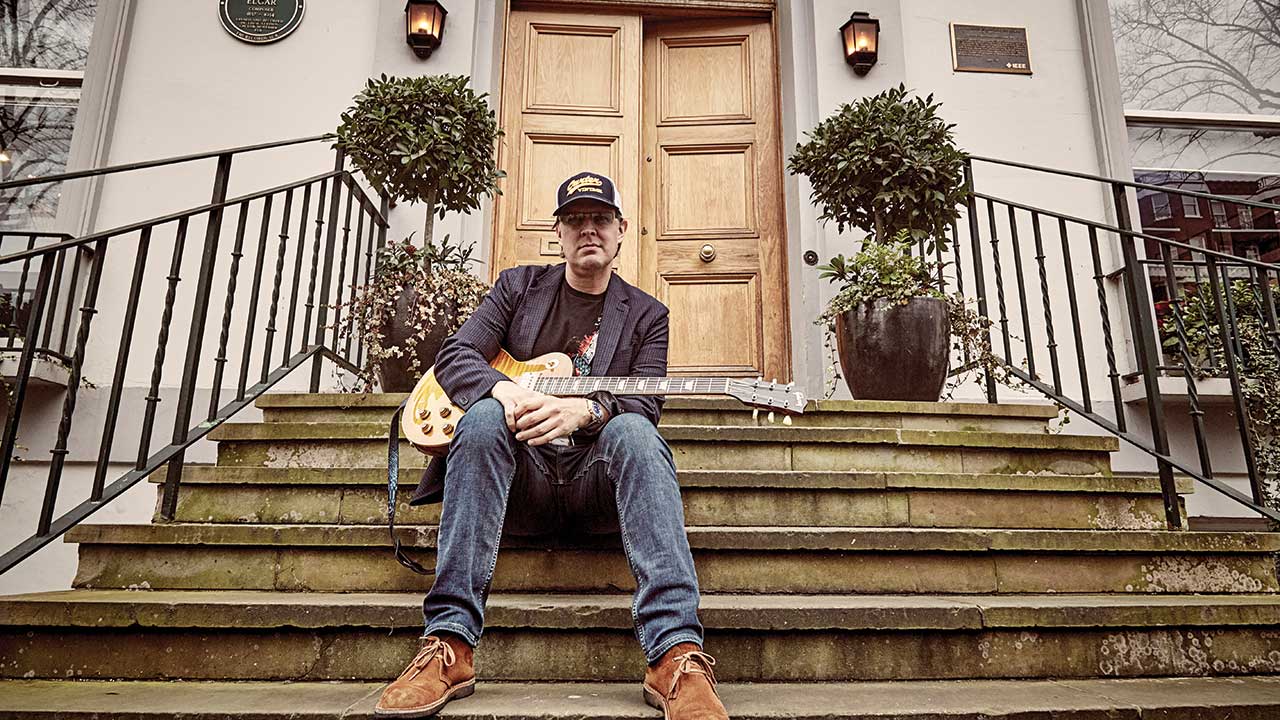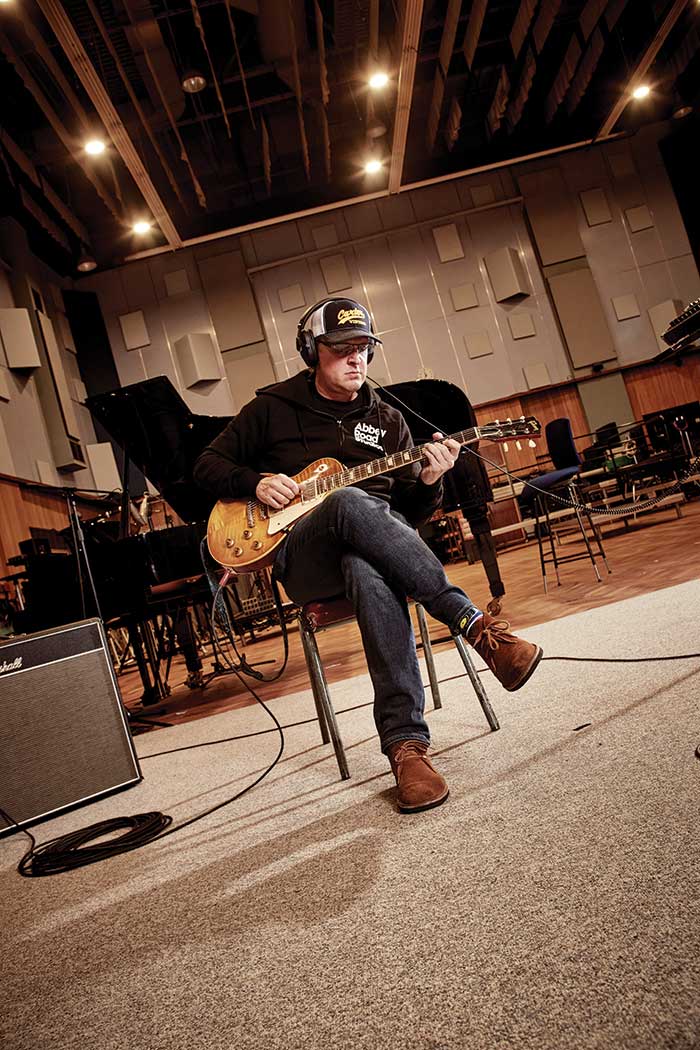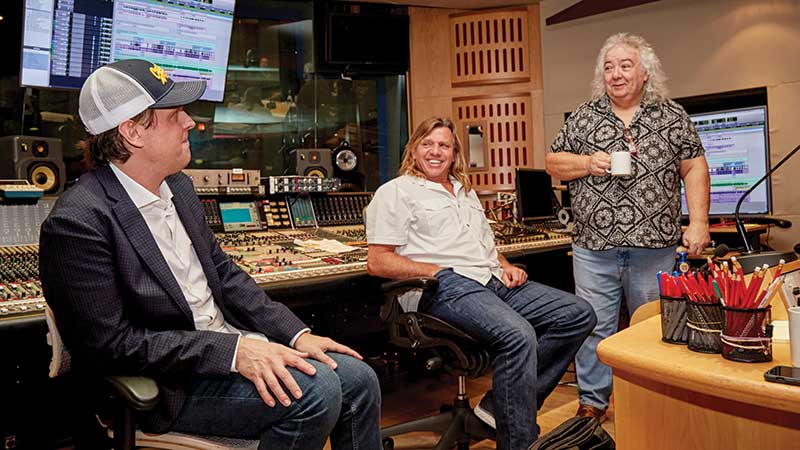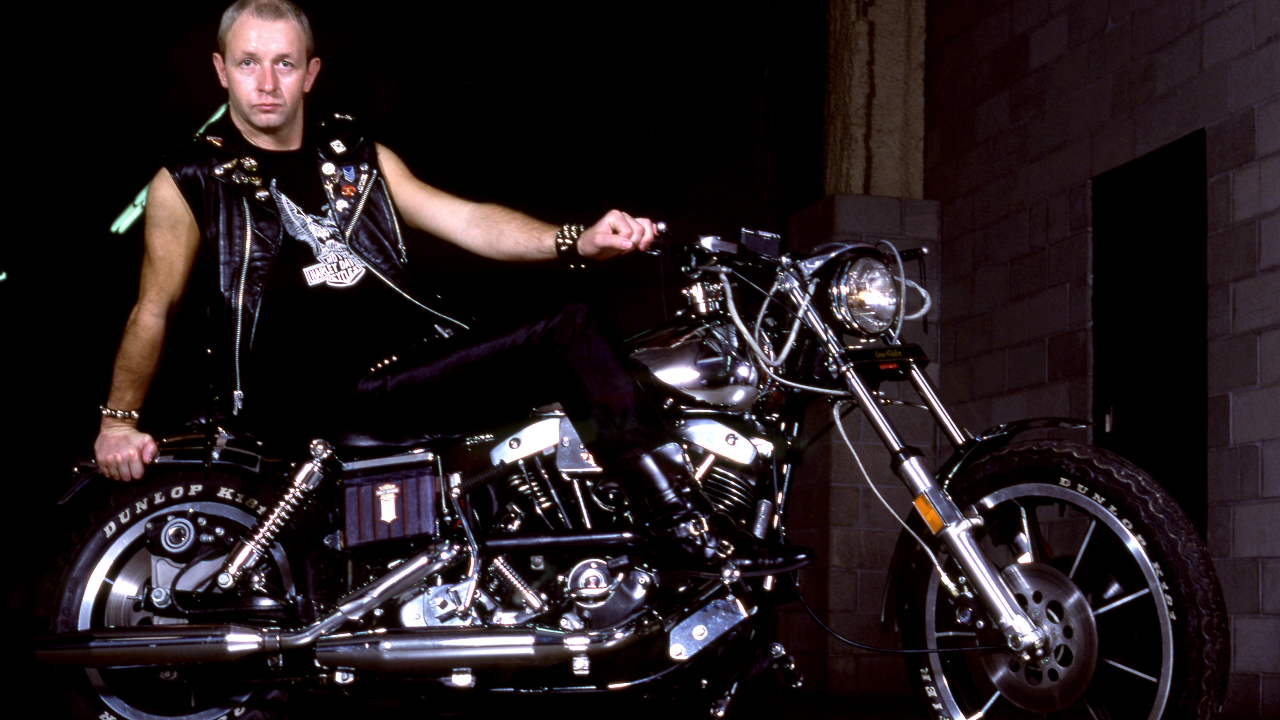The inside story of Joe Bonamassa's Abbey Road adventure
Fired up by the idea of making a blues-rock album in the city where many of his heroes did in the 60s, Joe Bonamassa beetled into Abbey Road to record Royal Tea with a little help from his friends

"I have the coronavirus,” Joe Bonamassa announces as he shakes hands and sits down barely three feet away. But this is early January; ‘COVID-19’ sounds like the name of a bad prog band, and that whole ‘thing’ seems far, far away, and will probably blow over. We’re oblivious to even the concept of ‘social distancing’, and nobody could anticipate the utter havoc that the C-word is about to wreak across the world.
We’re in the upstairs observation room at Abbey Road’s cavernous, breathtaking Studio One. The largest purpose-built recording room in the world, it easily accommodates the 100-strong orchestras used to soundtrack Hollywood blockbusters. It smells of aged wood, sweet dust and history. It really does. Its high walls are baffled by square and oblong soundproofing panels, seemingly placed at random but clearly not. When you speak in the ‘live’ room your voice sounds sharply present and then evaporates, spirited up and out into the space.
For today’s photo-shoot, Bonamassa stands in the 30-ish-feet-square corner of the room he and his band set up in to record his new album, Royal Tea (note the very English title).
He plugs in one of his many six-figure Les Paul guitars and launches into some tasty blues licks. The sound is massive – crystal-clear yet steeped in the creamiest natural reverb you’ve ever heard; it’s almost sensuous. His long-time producer Kevin Shirley is being only a little flippant when he says you can just plonk a top-end Abbey Road mic in front of a speaker here and you’re in business.
Of course, despite Bonamassa’s ominous self-diagnosis he doesn’t actually have coronavirus. The reality is that he’s been struggling with a stubborn sinus infection for the whole week that he, his band and Shirley have been here tracking the album. Shirley has his own struggle to cope with, having fallen heavily on his shoulder in Prague recently and torn muscles and/or tendons.
“This whole session’s been a fucking head-scratcher,” Bonamassa marvels. “Injuries! Plague! The record was supposed to be done last June – we were here, it was practically written.”
As he recounts the obstacles that were thrown in his road, he seems pretty relaxed. But Abbey Road is the most expensive studio in the world, and the album had to be finished within this one, intense week here.
Sign up below to get the latest from Classic Rock, plus exclusive special offers, direct to your inbox!

It’s noon on Sunday – the last day of recording – and the main takes are already in the can. All that’s left to add this afternoon are what Shirley calls “salt-and-pepper overdubs”, i.e. one or two alternative guitar lines, a few vocal tweaks, and some guest backing vocals from Bonamassa’s main co-writer for this album, former Whitesnake hitmaker (and fellow guitar collector) Bernie Marsden.
Shirley will then take all the audio away to his Caveman Studios in Sydney and put the final product together. Bonamassa leaves that process entirely to him. Shirley’s been a trusted collaborator since 2006’s You And Me. He’s the one who advised the young bluesman to scrub up and suit up.

Today Bonamassa’s in good jeans, a freshly purchased Abbey Road Studios hoodie and that ever-present baseball cap. He’s voluble and enthusiastic, his conversation crackling with a neurotic, obsessive energy. We discuss these ‘interesting times’: the cultural vandalism inflicted by Soho’s redevelopment just four miles across town (he’s aghast to learn that The Borderline has gone); the growing plight of the homeless in LA and across the USA; the Chinese government’s slightly ‘opaque’ approach to this new virus thing. And then there’s the whole reason he’s flown all this way: to realise a lifelong dream.
“I was the kid who wished he’d been born here in 1945, so I could be running around London in 1965, a Les Paul in one hand and a Bluesbreaker combo in the other. To see John Mayall live, Fleetwood Mac, Led Zeppelin, Cream – to be on that scene, that perfect storm where Hendrix shows up – it must have been extraordinary. At that point this city was responsible for changing music. And we’re still talking about it fifty-five years later. It’s unrivalled, unsurpassed.
“I’ve always wanted to make a British-style blues rock record, like my heroes, in London. I did the last two [Redemption and Blues Of Desperation] in Nashville and they have a sound: I hear Nashville in there – the studio, the writers, I think I even said ‘y’all’ at one point. I wanted to live here, write the album here, record it here, and my hope was that the DNA of London and that sixties British blues boom I love so much would permeate the album. And I think it has.”
Everything was originally in place back in June last year. Bonamassa had reached out to his friend Marsden, rented a flat near Abbey Road, had his gear shipped over and had set up shop. The two guitarists sat opposite each other and hammered out a set of Anglo-centric blues rockers. Bonamassa had brought along riffs and titles, and wanted Marsden to temper the music’s American accent, to give it some Brit flavour.
“I’d say to Bernie: ‘The American says it like this, but how does the British guy say it?’ One of the songs was originally called I Don’t Want Anything From You, but through Bernie we changed it to Don’t Do Me Any Favours. And I never would’ve gotten some of the chord changes. Sometimes Bernie would go to a minor where I’d go to a major – there are these little twists and turns that indelibly linked the music to the British tradition.”
He also called on Pete Brown, who wrote the lyrics for many of Cream’s songs, including the hits I Feel Free, White Room and Sunshine Of Your Love. “I’d met him a few times. I told him: ‘Pete, I need some of that beatnik crazy shit you wrote in the sixties!’ Next thing I know he sends me a poem called I Didn’t Think She Would Do It, and we cut the song. Pete’s seventy-nine, and still finds a cool way to rhyme ‘premonition’ and ‘nuclear fission’.”
Britain’s boogie-woogie poster boy Jools Holland also gets a writing credit on the album, as does Eurythmic Dave Stewart, and long-time Bonamassa collaborator James House contributed to what became the title track.
“We needed a fucked-up blues. James was in town, so here it is,” Bonamassa says. “We wrote Royal Tea and Lookout Man this week, but otherwise the record was already written by last June.”
Studio Two (aka the Beatles room/the Pink Floyd room, take your pick) was booked for June 2019. But then three days before Team Bonamassa were due to fly over, his long-time drummer Anton Fig fell and broke his right foot in three places. Options were weighed up, major names were considered as replacements, but ultimately Bonamassa decided to delay the recording.
“And I’m glad we did,” he says. “Anton’s an important part of the band’s sound, and we have those two new songs we wouldn’t have had last year. Everything happens for a reason.”
The expensive rescheduling meant moving from Studio Two to the much bigger One, but maybe that happened for a reason too. In here the main control room – Shirley’s lair with the mixing desk and Pro Tools gear – is on ground level, in Two it’s up a steep, unforgiving flight of stairs, less conducive for nipping in and out to confer and check things, especially for a band of this vintage.
Just before Fig, Michael Rhodes (“the most recorded bassist of all time”, Shirley tells us) and keyboard player Reese Wynans arrived in London, Bonamassa and Shirley reviewed and re-demoed all the songs so that the band could get straight to work.
Under time pressure things ran pretty well, the highly seasoned players averaging two or three songs per day. Bonamassa’s sinus infection presented a problem but eased, and in a marathon Saturday session that lasted from 11am until 6pm he nailed the lead vocals for seven tracks – and treated himself to a cigar afterwards.

Along with the accidents, ailments and logistical challenges, the Royal Tea album comes in the aftermath of more seismic upheavals in Bonamassa’s personal life. In June 2018 Classic Rock joined him on his tour bus as he travelled between shows in Holland and Belgium. At the time, his relationship with his girlfriend was unravelling and he cut a forlorn figure. He was sad, distracted as he nursed a whisky, and clung to his phone, deep into it with someone, in all senses, thousands of miles away. He shakes his head ruefully at the memory.
“I was a hot mess. I had no business being on the road,” he recalls. “The bottom floor fell out from under my life overnight. I was playing and singing okay at those shows, but I was shaken to my core. She had called it off, and that was the implosion.”
When he got home to LA he made changes. He quit drinking, just to prove that he could. He cut off some of his fair-weather ‘Hollywood friends’ who were taking up too much of his bandwidth, and he focused on reconciling with his girl. “That lasted for a year and a half, and then we finally decided to end it last year, because we didn’t want to resent each other. We were friends first and had known each other for a decade. We love and respect each other; it was never ‘Fuck you!’, ‘No fuck you!’ It was difficult. But as soon as we made the decision, the pressure was off and we were our normal selves again.”
It was suggested to Bonamassa that he see a therapist. And he did go, seeing a “nice woman in a nice office in Beverly Hills” just twice before deciding it wasn’t for him. He even got a cool song out of it, A Conversation With Alice (not her real name). “I did some psychoanalysis while talking to her. I said that one of the things I run from in my life is average. Normal. Lukewarm. I want to be loved or hated. I want to be a character. ‘Why can’t you be a little bit more normal?’ ‘Why do you have to buy every fucking guitar that you see?’ ‘Why do you fixate on things and go down these rabbit holes and act like the neurotic kid?’
"You know what? That makes me good at my job. I am an eccentric person, and the older I get the more of a character I become. Socially I’m awkward. I say things out loud that I should keep internal sometimes and I don’t shy away from having an opinion on things. But it makes me good at my job. Part of this album was embracing that, and getting a little angry, finding that piss and vinegar from my twenties again."
It’s as if the split has charged Bonamassa with cognitively dissonant, ‘sorry-not-sorry’ energy. His girlfriend called him out on certain damaging behaviours – cynicism and inflexibility chief among them – and he says that this album “is almost like a thank-you letter to her for calling me out and pulling the ejector seat. She saved me from spiralling into worse patterns of behaviour, and I’ll really be forever grateful.”
But then he has also re-evaluated certain intractable traits that have helped put him where he is today. “Part of the cathartic thing about the album is addressing those things about me that were wearing on her. She was hopeful I would change. But I’m very rigid. I live my best life. I play blues-rock music for hundreds of thousands of people every year. I tour the world. People call me ‘Mr Bonamassa’ at nice restaurants.
"Why would I want to psychoanalyse it? I’ve accomplished everything I’ve ever wanted to do, I’m so happy with what I have. Every left-hand turn I took, right or wrong, worked out. Every personal relationship I had led to this moment. You can’t undo the past, and nor would you want to.”
Who says therapy doesn’t help you see the wood not the trees?

Later in the afternoon that we meet, we’re in the control booth of Studio One. With Abbey Road’s attentive assistant engineer Chris Parker at his side, Kevin Shirley is working the enormous Neve mixing console to his left, and tapping keys on the Macintosh running Pro Tools to his right. Pumping out of the speakers (the type that audiophiles have wet dreams about) is a baleful power ballad called Why Does It Take So Long To Say Goodbye (a little Deep Purple, a lot Whitesnake, Bernie Marsden’s fingerprints all over it).
Rigged over the desk and window giving out on to that grand live room, a massive computer monitor relays Shirley’s Pro Tools display: guitars, bass, drums, keyboards and vocals streak right to left as audio waveforms in blue, red and pink. “I really like that ‘brown’ sound you had yesterday,” Shirley tells Bonamassa. “Let’s do it,” says the guitarist, and work resumes.
The irony is that Bonamassa has already freighted “a million and half dollars’ worth” of guitars and other gear back to the States, so today he’s slumming it with the most beautiful Gibson Les Paul – duly set up by stalwart guitar tech Mike Hickey – and, in the amp room next door, a hundred-quid practice amp purchased from Macari’s on Denmark Street for his hotel room (“It’s got a “good, tight mid-range”, apparently).
With the track booming from the speakers, Bonamassa leans over the fretboard and doubles the main riff. From a few feet away you can see him concentrating. There’s another take, then Shirley nods. “Great. He’s pretty good really, isn’t he?” he asks the room. And we (the PR, record company rep, Bonamassa’s videographer) have to agree – he’s not bad at all.
Shirley’s smile is broad, as are his shoulders, his South African accent, and – at times – his acute sense of humour. (“Why Does It Take So Long To Say Goodbye? Because they won’t fucking leave!”) You wouldn’t want to piss him off, but the producer runs a happy, efficient studio. Whether giving orders in an Austin Powers accent or musing that racoons are actually miniature pandas, he makes the whole process fun.
To do some vocal re-takes, Bonamassa heads for the adjacent microphone room and puts on headphones. With his sinuses now clear, he does a line here, doubles a chorus there. There’s a ‘fucking’ in the urgent, down-tuned rocker Every Time One Door Opens that needs an alternative, U-certificate ‘freaking’. Similarly, a galloping, Iron Maiden-style anthem that includes Pete Brown’s very English line ‘Stop your fuckin’ moanin’ needs what Bonamassa calls a “Walmart version, in the event that we need it for, say, a car commercial. We’ll record it now to save flying all over the world later, matching microphones.”
Bassist Michael Rhodes enters the room. Tall and wiry, decked out in black from beanie to boots. Every line in his face has been earned over 60-plus years, each one a chapter-in-waiting for a riveting memoir as yet unwritten. To shake Rhodes’s big right hand is to feel your own as a child’s. He and his wife will be heading home to Nashville in the morning, and they’ve come to say goodbye and see how it’s going.
Over the intercom Shirley asks Bonamassa to do another take of the "fucking moanin’’ line but to make it angrier. “Think of Biloxi Mississippi,” Rhodes offers cryptically in his warm Louisiana tones. “That’ll make you angry!”
Bonamassa doesn’t reply, just shoots him an in-joke grin. Next is a bluesy shuffle called Hangups (original title: Excess Baggage). Shirley offers to put a tubular bell over the ‘shit’ in ‘I got me a woman/Shit, she’s crazy as hell!’ “A broken bottle!” Rhodes suggests. They opt to edit the word out altogether.
Bearing in mind our conversation about Bonamassa’s ex-, won’t there be some clarification required when she gets to hear some of Royal Tea’s more acidic lyrics? “Oh, I’ll be getting a call mid-October,” he says, smiling in the teeth of that awkward conversation to come. “This is by no means directed at my ex-partner. This is what songwriters do. She’s a songwriter so she’ll understand conceptually why I did it. But yes, that call’s coming, guaranteed!”
The afternoon drifts by. These people are easy in their own talents, comfortable with each other’s, and all of them share the same goal. You begin to see why good results have come so quickly – it’s experience. Even in this rough mix, the music is shaping up so well.
Bonamassa leaves to pose for more photos. He returns wearing jeans, shirt and suit jacket, declaring today to be “Business Casual Sunday”. In down time he and Rhodes discuss the best brass sounds on record. Rhodes loves the Memphis Horns, how they were always just a little out of tune. On his phone Bonamassa calls up Albert Collins’s Frosty as an example of the cool, nonchalant way he likes his brass.
Bernie Marsden arrives and is greeted with hugs. There are erudite words and in-gags about the record so far, and Shirley gives him a rough plan of what’s required for him “to earn his honorarium”. During a quick photo-shoot Marsden and Shirley smile and jokingly jostle for position, each in the hope of hiding their girth behind the other’s.
Charismatic, fun and smart, Marsden emanates a very English sense of rock aristocracy. His place in this project makes even more sense with him in the room. He’s barely finished his coffee and most of a bunch of grapes before he’s marched into the vocal booth with Bonamassa, where he adds his English tones to catchy rocker High Class Girl (with ‘low-class ways’). Then he sweetens the chorus of the mid-tempo Savannah. This one’s in a southern, Allman Brothers mode, and is the least British-sounding tune so far.
With that creamy reverb pouring back into the control room from Studio One, Bonamassa’s last guitar take is a stunning slide piece for the track. He plays it on a recent addition to his world-famous collection. Christened ‘Lazarus’, this 1959 Les Paul was painted a crude red when he bought it. He’s had it restored, and reckons that in its current condition it’s worth about three hundred thousand dollars.
So, given that jaw-dropping figure, how does it play? Does it feel like $300k? He shrugs and says: “It just plays like a fifty-nine Les Paul. The value’s all in these tiger stripes.” He smooths his fingertips over its gleaming finish.
By early evening Shirley’s got everything he needs, and Team Bonamassa’s British adventure is winding down. Audio files are downloaded, gear is broken down, and Abbey Road runner Marta brings in some bottles of very fine red wine, on the house.
Some unprintable professional anecdotes/war stories are shared, and talk turns to flights home and Bonamassa’s ‘Keepin The Blues Alive At Sea’ Mediterranean cruise in June. (Nobody knows it now, but that will end up being postponed until 2021, yet another coronacasualty in this “fucking head-scratcher” of a year.)
For now, though, here in this moment, it might as well be 1968.
A music journalist for over 20 years, Grant writes regularly for titles including Prog, Classic Rock and Total Guitar, and his CV also includes stints as a radio producer/presenter and podcast host. His first book, 'Big Big Train - Between The Lines', is out now through Kingmaker Publishing.

